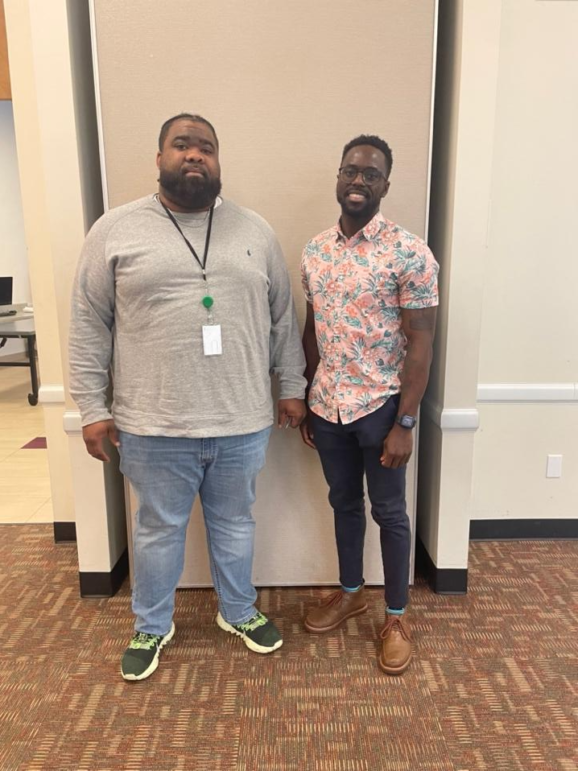On Apr. 25, the East Lansing Public library gave space to Community Mental Health (CMH) and two representatives in hopes of informing youth in the community about tools to deal with stress, anxiety, and other mental health issues; and how to understand why those mental health issues might have presented themselves.
The two CMH counselors present were Tevin Larmond and Dulles Copedge. Both Tevin and Dulles talked about their inspiration for the work they do and why they feel spreading mental health awareness is critical, especially in our world today.
Tevin, whose has been working in this field for 5 years and has his masters degree in psychology, has a specific passion for working with children and helping them to develop coping mechanisms for mental stress.

Charles Clifford
Tevin Larmond and Dulles Copedge at Coping with Life held at ELPL.Tevin’s mother was a schoolteacher during his childhood which allowed for him to see the care and time his mom put towards bettering future generations.
“I like bringing kids into the light so they can see their full potential,” Tevin said.
The most rewarding part of the job for Tevin is “seeing the happiness on their face and them seeing things are going up for them. It’s really cool to see.”
Dulles Copedge, who has a degree in criminal justice and sociology, has similar motives to Tevin for giving back to the youth.
“The biggest change we’ve seen is their understanding of emotions. We ask them questions about how they feel or how certain things at home or school make them feel. At first, they are reserved and may not fully understand what triggers a certain emotion, but by the second and third visit they have shown substantial progress in their emotional understanding.” Dulles said. “There is still a large stigma on mental health and people tend to shy away from their own.”
Both Tevin and Dulles believe the work they do may be more crucial to society than ever. With rising suicide rates and mental health related violence, like mass shootings, they both feel resources like CMH need to be more available.
“I think it’s important for everyone – children and adults,” Dulles said. “In my opinion, it’s easier to get children to open because they still view you on some level of authority. But, with adults, it may be harder to teach them that it’s okay to share your emotions, especially if they are from an older generation.”
Dulles also believes that you must invest in your mental health if you want it to be in the right space.
“Mental health is with you in the long run. There is no quick-fix and holding in those feelings only perpetuates the negative aspects of mental health. Kids and adults need to understand it’s okay to talk. We all have feeling,” Dulles said.
MSU student Zach Moon joined for a session at the public library.
“I’ve never been a big believer in therapy but knowing that there are resources available if I ever need help is comforting. It would have been nice to have this resource in high school,” Moon said.
For more information or mental health resources you can visit http://www.ceicmh.org.